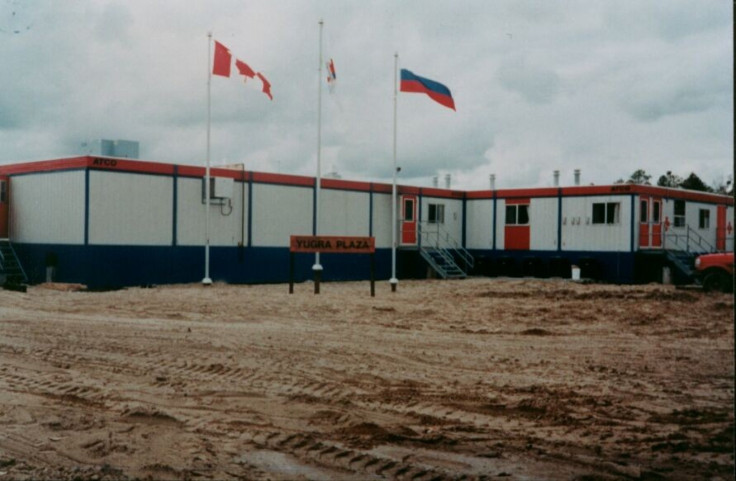How Do You Steal An Oil Field? Norex Suit Against Russian Billionaires Alleges Plot

The story that will follow is one of corporate machinations, armed strongmen storming a Siberian oil field and an office headquarters, corruption and ludicrous amounts of money.
Feels like James Bond, no? But in 2001, according to Norex Petroleum's ongoing suit, it all happened.
The story starts after the Soviet collapse, according to court documents filed in the Supreme Court of New York City, by Norex in June 2011.
In 1991 Norex Petroleum, a collection of Canadian and other oil industry players, partnered with Russian oil company Chernogorneft to form a subsidiary called Yugraneft, which developed an oil field in Western Siberia. For years, according to the suit, Yugraneft paid millions in dividends to both Norex, which held a majority share in the venture, and its partner. For a while, it was good.
But Russia, with its vast oil reserves, was ripe for the picking as the soviet dust settled. The stage was set for an epic corporate turf war and the goal of which was to secure billions in revenue.
Several thousand miles away and somewhere in New York City, according to Norex, Russian billionaires Leonard Blavatnik and Victor Vekselberg, at the head of their respective companies, conspired with Alfa Group Consortium to form TNK to help wrestle control of Russian oil fields following the Soviet fall.
By 1998, the two allegedly had their plan established. That year, Chernogorneft went bankrupt. A year later, TNK assumed Chernogorneft's entire 40 percent share in Yugraneft.
But in March 1999, it was revealed that Chernogorneft did not make the initial capital investment it said it would at the start of the Yugraneft joint venture, which put Norex's shares in the oil field at over 90 percent instead of the initially planned 60 percent.
Not to be outdone, according to the suit, conspirator TNK filed a complaint in Russian court against Norex, claiming Norex's technical know-how brought into the original joint venture was improperly assessed and therefore so was its ownership of its majority shares. Norex alleged that Russian officials were bribed and upheld TNK's claims in June 2001, preventing Norex from using its voting rights as a majority shareholder in an upcoming shareholders' meeting.
But because TNK did not, according to the suit, register its newly acquired shares under its name at the time of the meeting, Norex was able to use the unregistered shares to reinstate Yugraneft's original director general.
Norex narrowly fought off an attempt on their company, but based on Norex's version of the story, what followed was an unfolding of events that played out like a Hollywood movie.
The very next day on June 29, 2001, 16 TNK militiamen wearing fatigues and armed with Kalashnikovs entered Yugraneft's corporate office, accompanied by attorneys. They announced TNK had assumed control of the company the day before at the shareholders' meeting and presented doctored minutes of the meeting to prove their claim, said the suit.
TNK militiamen then returned several days later, cut off Yugraneft's phone and internet service, and occupied the company's oil field and field office.
On July 17, 2001, according to the suit, TNK's president visited Norex's field operations in Siberia and informed employees the company had been taken over and that employment agreements with the new owners were in order.
Foreign employees fled the country.
By Jan. 24, 2002 Russian courts ruled in favor of TNK, and reduced Norex's total ownership to 20 percent. Since then, profits from the oil field have been diverted away from Norex. In 2003, BP and TNK became equal partners forming TNK-BP Ltd., and assumed control over Yugraneft's assets, the suit said.
Almost a month later, Norex filed suit in the Southern District Court of New York. The case was dismissed. In June 2011 Norex took its case to the New York Supreme Court.
Norex Petroleum officials are hoping to retrieve more than $1 billion in damages and lost revenue, and are waiting for the New York Supreme Court to rule if it will take on the case.
For more than ten years, Norex has wanted a chance to be heard in court on the merits of our claims, said Norex Petroleum Chairman Alex Rotzang in a statement provided to the International Business Times. We believe our case is compelling and backed up by the new evidence.
On Thursday of last week, defendants in the legal case asked a New York judge to dismiss Norex's allegations that its oil field was stolen more than a decade ago, calling the continued case a tired rehash of the same preposterous claims, Mike Sitrick, a spokesman for Leonard Blavatnik, told Bloomberg.
A decision on whether or not the court will dismiss the case is likely to come by early next year.
This is a window into everything that happened after the Soviet empire collapsed in the Reagan era, said Barry Ostrager, one of the attorneys representing Norex. [Russia] is still a corrupt society. No one really knows what is going to happen in Russia.
While anything is possible, given the facts and the law, I can't imagine that the defendants' motions to dismiss would be granted, Ostrager said.
© Copyright IBTimes 2024. All rights reserved.











